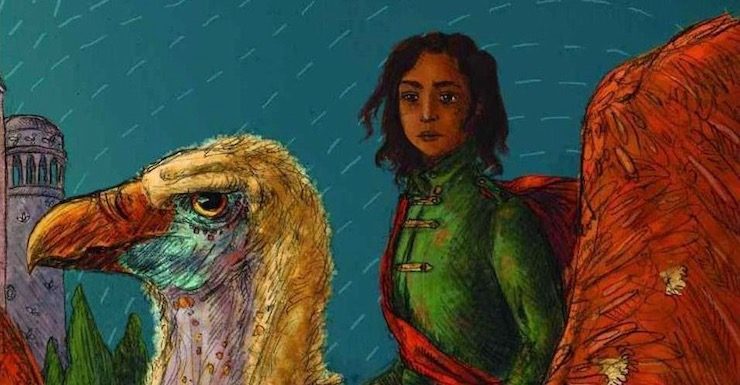Since you’re reading this post on Tor.com, I think it’s fair to guess you’re familiar with science fiction and fantasy publishers. Maybe you can even pick out the publishers’ logos on your book’s spines: You know that mountain there means Tor, that that little planet is Orbit, and that DAW’s logo almost looks like a bird. But the more you read, the more you’re likely to hear about exciting books from smaller presses—books that you may not always find in bookstores, but that you will want to read. So I’d like to tell you a little bit about small presses, their market, and their role in the science fiction and fantasy community.
I remember the moment I first discovered small press books. It was 2008, and I’d just started reading—and admiring—Tad Williams’s Memory, Sorrow, and Thorn trilogy. I was eager to see what he’d published since the end of that series, so I typed his name into Google. Eventually I found myself on the website of Subterranean Press, which I’d never heard of and which had just published a 400-page-plus collection of Williams’s short fiction. This collection was a limited edition—only a few hundred copies of the hardback were printed—and every online retailer was charging the full sticker price of $40 for it. I didn’t know if I could justify spending that much on a single book, but then I remembered that this limited edition was also signed.
I bought the book. It was worth every cent, and I knew I’d buy more Subterranean books. I did find myself with a few questions: What was this publisher? How did they create such lovely books? And were there other publishers like them? There were indeed: Let me tell you about a few of them.
Small Beer Press

If you’re a longtime reader of Tor.com, chances are you’ve heard of Small Beer Press books: You may recall reading about their Kickstarter for John Crowley’s version of The Chemical Wedding, or you might have been led to one their Joan Aiken collections through this site. Perhaps you learned about Sofia Samatar’s fiction, or Ursula Le Guin’s translation of Argentinean fabulist Angélica Gorodischer. Gavin Grant and Kelly Link’s company publishes several books a year, and each book they publish seems to be different from the one before. As Gavin wrote to me, this is by design: “I want to read about all parts of this world (and others!), not the same old stories I’ve read before. I want different, diverse voices.” Or, as he put it in another context: “We’re trying to bring the outside in and break the Moebius loop of what’s known and unknown.” This is a challenge, but I for one believe Small Beer has met it.
You’ll find Small Beer Press titles in most self-respecting bookstores, though they may be spread across several departments: general fiction, criticism, science fiction/fantasy, and mystery.
Subterranean Press

Other small presses may require a little more effort to locate. Subterranean Press, which provided my initiation into small press books, is one such publisher: Their books are widely available online, but at your local bookstore you’ll probably have to place a special order.
Subterranean’s website makes their books look very attractive, but somehow never quite does justice to how well-crafted they are. Some of the most beautiful books I own come from Subterranean, like a set of Jack Vance collections with Tom Kidd covers, a signed copy of Alan Moore’s Voice of the Fire, and Lucius Shepard’s final novel. As Bill told me in an email, even their less expensive titles have smyth-sewn binding, real-cloth covers, high-quality paper, and artwork commissioned especially for the book. Some of their higher-end books come with hand-built tray cases. These books may cost a little — or in, the case of numbered and lettered editions, a lot — more, but I’ve never regretted a purchase, though I kick myself for not getting some books when I had a chance. I’m thrilled that Subterranean publishes The Dragon Griaule as an ebook, but I feel deeply silly for missing the hardback.
Many titles originate at Subterranean, like K.J. Parker’s collection Academic Exercises, one of my favorite books of 2014, while other Subterranean books are deluxe editions of books published for the mass market. When I asked Bill Schafer, one of the press’s co-founders, to describe a quintessential Subterranean production, he talked about the ways high production values improved the reading experience for The Shadow of the Wind by Carlos Ruiz Zafón and The City & the City by China Miéville. “In each case,” Bill wrote, “we were able to upgrade the paper from our normal stock, print the books in two colors throughout, in ways that add to the readability of the novels, especially the Miéville.”
Tartarus

There are dozens of great small presses in the United States, but some of the best work in the field happens overseas. Tartarus, based in Yorkshire, is one of the foremost UK small publishers. Its books of “literary supernatural/strange/horror fiction” are famous for their eclecticism and quality. One month they might reissue stories by an obscure nineteenth-century clubman; the next month they might publish a contemporary work like Nike Sulway’s Tiptree-winning novel Rupetta.
Whatever they publish, Tartarus books are easily recognizable. While Subterranean and Small Beer publish books of all shapes and sizes, most Tartarus volumes have a uniform look created “compromise between the minimal, restrained design of Edwardian limited edition books, and the exuberant color of Gollancz’s yellow jackets,” though Ray Russell and Rosalie Parker, co-proprietors of the press, added that “under the jackets, [our books] have had some quite wild boards in recent years.”

Although most Tartarus books originate as limited edition hardbacks, their books frequently go on to great success in the wider world. In 2014, Tartarus issued Andrew Michael Hurley’s debut novel The Loney. Soon enough, a major newspaper reviewed the book, Stephen King praised it, Tartarus sold out of copies, a new publisher issued the book, ads for The Loney appeared in the London Underground, and Hurley won the Costa Book Award for First Novel.
Robert Aickman is another great Tartarus (re)discovery. Although Aickman was a celebrated short story writer, a winner of the World Fantasy Award, and a critical favorite, before Tartarus began publishing him in 2000, his work had been unavailable for years. Aficionados of the supernatural wanted to read him, but his books often cost three figures if they could be found at all. Tartarus continues to publish Aickman; it’s fair to say that they’ve made him more popular than he ever was in his life: New paperback editions are now available on both sides of the Atlantic.
In the eight years since I learned about Subterranean, I’ve become a bit of a small press evangelist. This brief introduction can only give the barest hint of the vital role they play in sf, fantasy, and horror; I hope it will inspire some of you to investigate further.
Matt Keeley reads too much and watches too many movies; he is helped in the former by his day job in the publishing industry. You can find him on Twitter at @mattkeeley.










